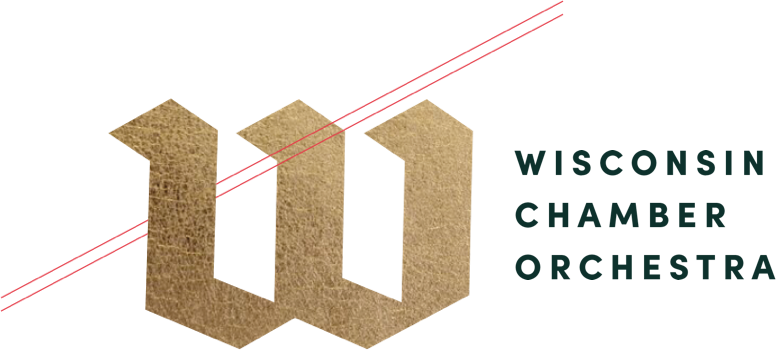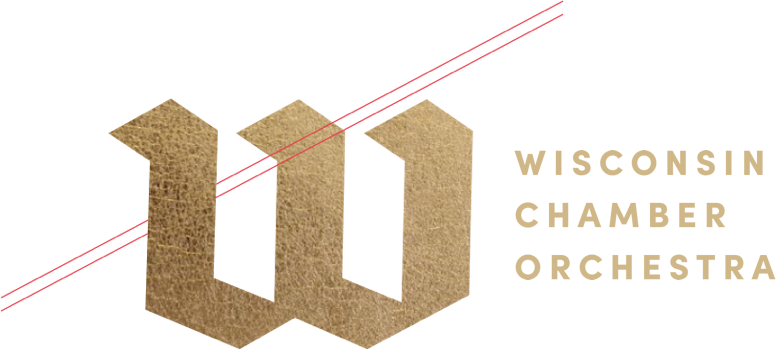The Wisconsin Chamber Orchestra was founded in 1960 by Gordon B. Wright as the Madison Summer Symphony Orchestra. The Summer Symphony’s repertoire consisted of great orchestral music from all ages. Our concerts were free to the public from the beginning. Upon leaving Wisconsin in 1969, Wright tapped David Lewis Crosby to lead the orchestra.
In 1974, the Madison Summer Symphony officially became the Wisconsin Chamber Orchestra to reflect our expanded mission to serve communities across the state throughout the entire year. Continuing to grow, in 1980, we debuted our first season of indoor concerts, called the Artist Series, at the Madison Civic Center during its first year of operation. That series has evolved over time and today is the WCO’s Masterworks series, which has brought dozens of world-class guest performers to Wisconsin audiences.
In the winter of 1983, Madison businesswoman Pleasant Rowland saw the opportunity to improve access to the arts and create a sense of community while gathering on the beautiful Wisconsin State Capitol lawn. By the next summer, that idea evolved into our first season of Concerts on the Square. Like today, the series was completely free of charge for the entire community. It has grown into a gem of Madison, and annually over 200,000 patrons come together on Square for this six-concert series.
Following the unexpected passing of Maestro Crosby in 1998, Andrew Sewell was named Music Director in fall 2000. Under Maestro Sewell’s 20 years of leadership, the WCO’s ventures have grown to include the statewide Young Artist Concerto Competition, Messiah performances at Blackhawk Church, performances of The Nutcracker in collaboration with Madison Ballet, and our Side by Side project concerts with young musicians of the Wisconsin Youth Symphony Orchestras.
The WCO has been a resident company of Overture Center for the Arts in Madison, WI since its opening in 2004. The Overture Center was made possible by the trailblazing philanthropy of Jerry Frautschi, who donated $205 million to initiate its creation. Since becoming one of the resident companies of Overture, the WCO has fully established itself as one of the premier chamber ensembles in the United States and brings the best of classical music to hundreds of thousands of Wisconsinites each year.
WCO Milestones
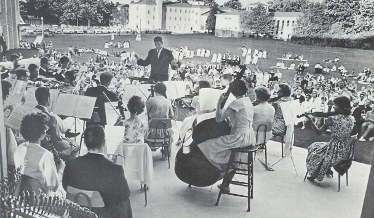
1960
Conductor Gordon B. Wright founds the Madison Summer Symphony. The first performances of this new orchestra take place during the summer months at the East Side Business Association on the shore of Lake Monona. Following the first season, performances were moved to Edgewood College on the shore of Lake Wingra, where they remained for the next 10 years. The orchestra performed a four-concert series on Sunday evenings in July. Three people comprised the board of directors during the ’60s, and all concerts are free to the public.
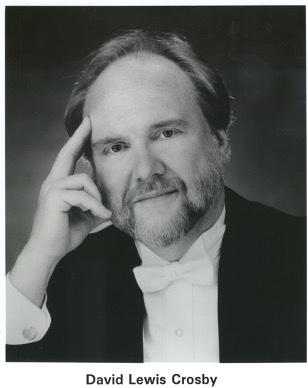
1968-1969
Gordon Wright is engaged as conductor of the Fairbanks College Symphony Orchestra in Alaska in late 1968. David Lewis Crosby moves to Madison about this same time and meets Wright in Otto-Werner Mueller’s graduate conducting class. Wright recruits Crosby as Wright’s successor. Crosby assumes the titles of Artistic Director and Conductor. The annual budget is $4,000.
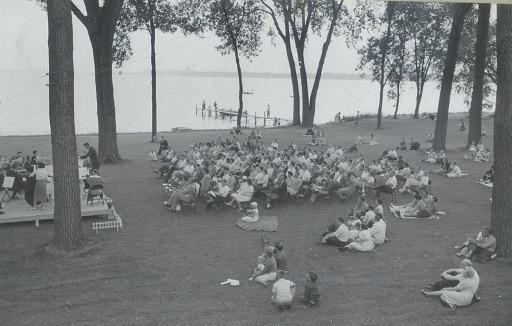
1974-1975
The Madison Summer Symphony changes its name to the Wisconsin Chamber Orchestra to reflect its expanded mission to serve communities across the state. The summer series is now performed at various parks in Madison.
1980
The WCO debuts the Artist Series – a series of performances featuring classical repertoire and guest artists during the fall and winter months. It performs this season in the Madison Civic Center during the Civic Center’s first year of operation. The core orchestra grew from 20 to 30 musicians.
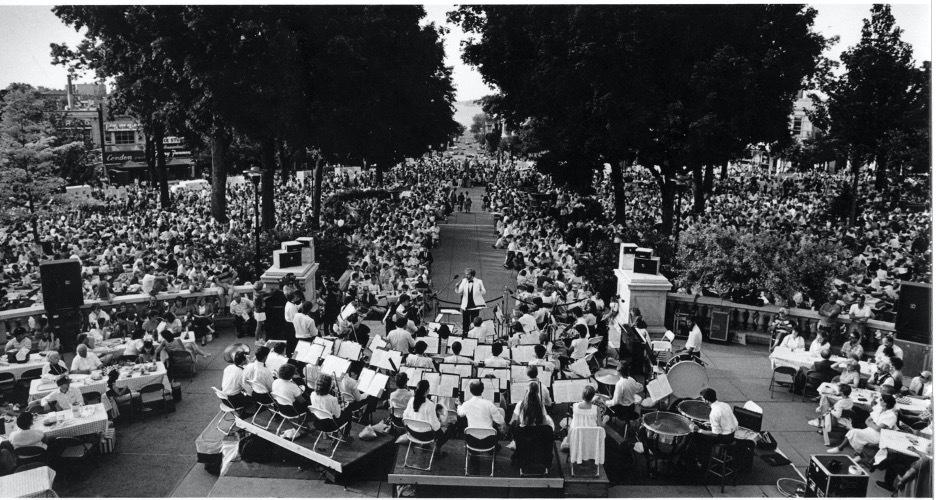
1983-1984
Pleasant T. Rowland, a Madison businesswoman, approaches the WCO about moving its summer programming to Wisconsin’s Capitol Square. Subsequently, the first season of Concerts on the Square takes place in 1984. Founding sponsors for the series are the Evjue Foundation and the Norman Bassett Foundation. The Board of Directors is in place. The first full-time manager is hired. The annual budget is approximately $150,000.
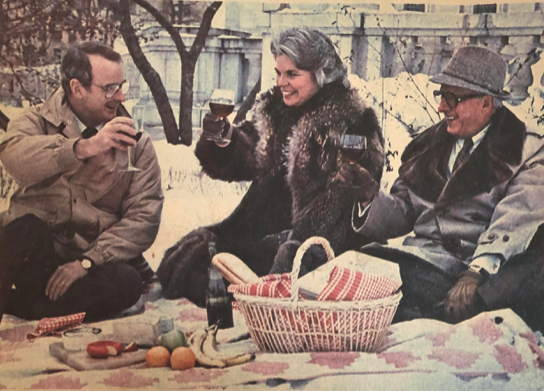
1985
Artist Series moves to First Congregational Church to take advantage of the superior acoustics, sight-lines, and price.
1991
The run-out program begins with a performance in Columbus, Wisconsin. The stage is built from scratch and shaded by a winter pool cover.
1992-1994
The WCO experiences a running $50,000 budget deficit for years 1992-1993. Wisconsin’s state government bails the WCO out with a one-time $100,000 grant to cover the deficits. The WCO develops its first long-range strategic plan to provide clear direction and a strong foundation for the Orchestra. The orchestra finishes the year with a small surplus absent state funding.
1998
Madison mourns the sudden death of David Lewis Crosby on July 29, just two hours before the final Concert on the Square of the season is to take place. Following a tribute concert in September, the WCO Board announces an 18-month search process that will be used to select Crosby’s successor. Crosby served the WCO for 28 years.
The day before Crosby’s death, local businessman Jerry Frautschi announces a $50 million gift for a new arts facility in Madison. Ultimately, the gift grows to over $200 million by the time Overture Center is completed in 2006. WCO has the opportunity to be part of the planning process for the new facilities.
1999
The WCO celebrates its 40th anniversary. The Music Director search draws over 240 applicants from around the world; a new logo is developed; and the Artist Series is renamed Concerts OFF the Square.
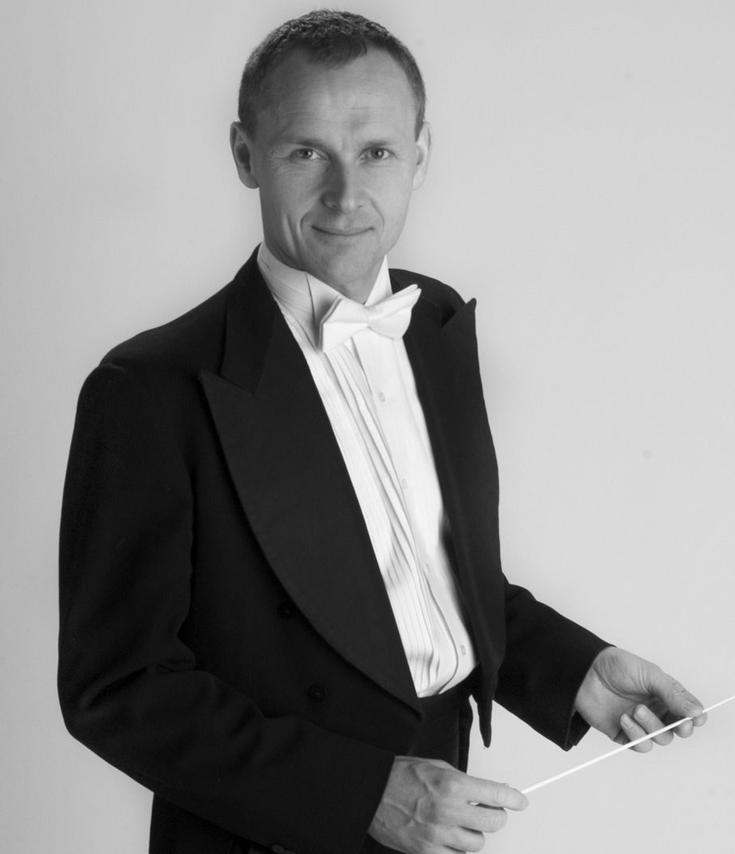
2000
Andrew Sewell is appointed the WCO’s third Music Director on February 1. Concerts on the Square take place on the Hamilton Street corner due to renovations and a three-year street beautification project on the Square. The indoor series consist of three concerts occurring on Wednesday nights at 7 PM dubbed “Concerts Off the Square.” The popular WCO Halloween concert is inaugurated and continues for eight seasons. The WCO accompanies the Madison Ballet’s Nutcracker using the full orchestra. The first Young Artist Concerto Competition for Dane County high schoolers is held.
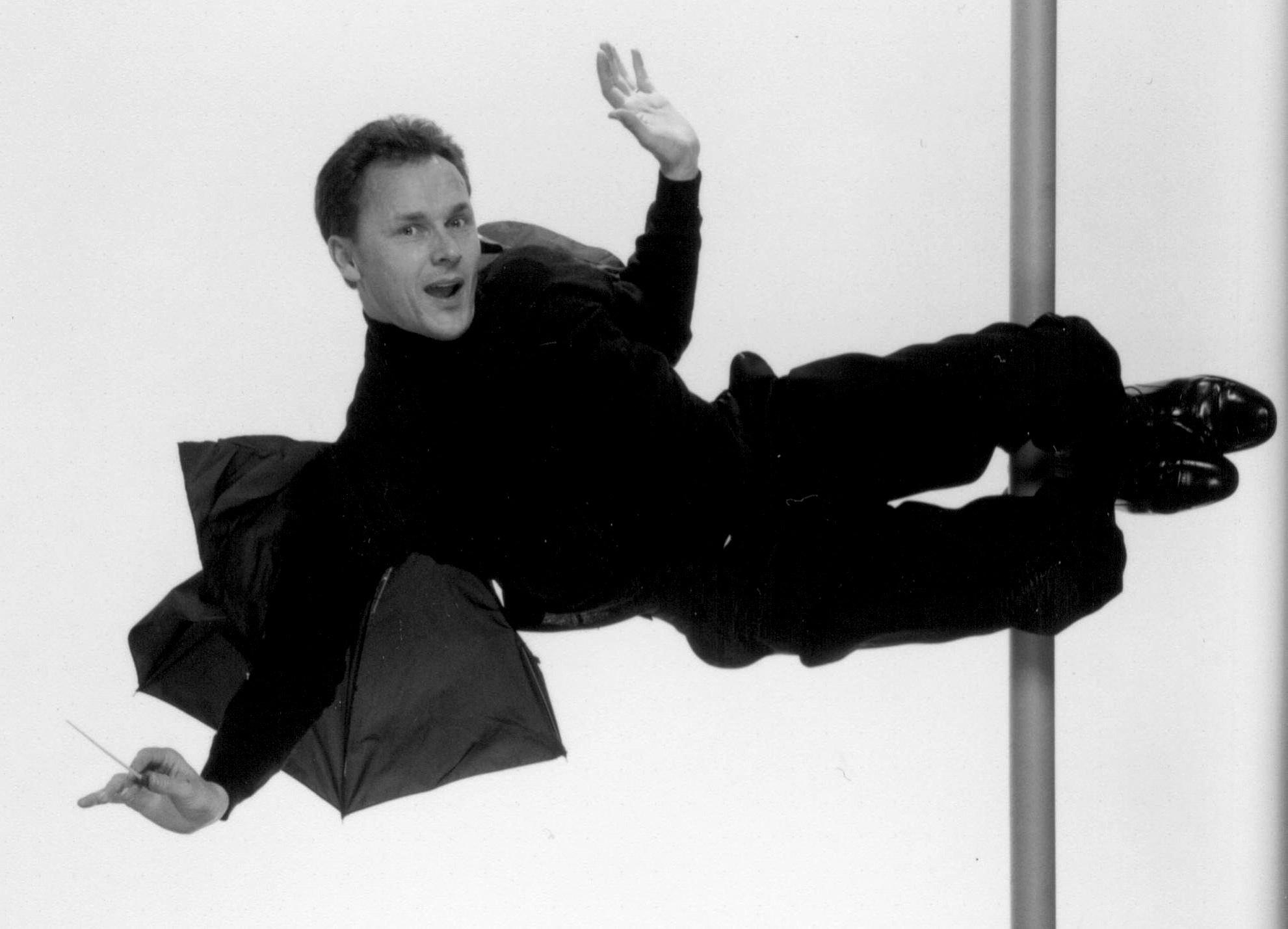
2001
The WCO Board approves a new, five-year strategic plan, which ultimately encourages Pleasant T. Rowland to offer the WCO a $5 million endowment challenge match. The Artist Series is renamed as the Masterworks series and increases to four classics concerts. Megastar soprano Sylvia McNair sings on the Square, and the WCO launches Concert in the Woods at the American Players Theater in August, with Rachel Barton as soloist. The opening Masterworks concert on September 12 goes ahead, despite the attacks on the Twin Towers of the World Trade Center the day before, bringing comfort and solace to a community in shock.
2002
Sir James Galway opens the Masterworks season. The WCO embarks on two runouts to Prairie du Sac at the River Arts Auditorium in November and March, and also to Brookfield in the spring of 2003 with Rachel Barton again as soloist. The Concert in the Park series on Madison’s far west side is inaugurated.
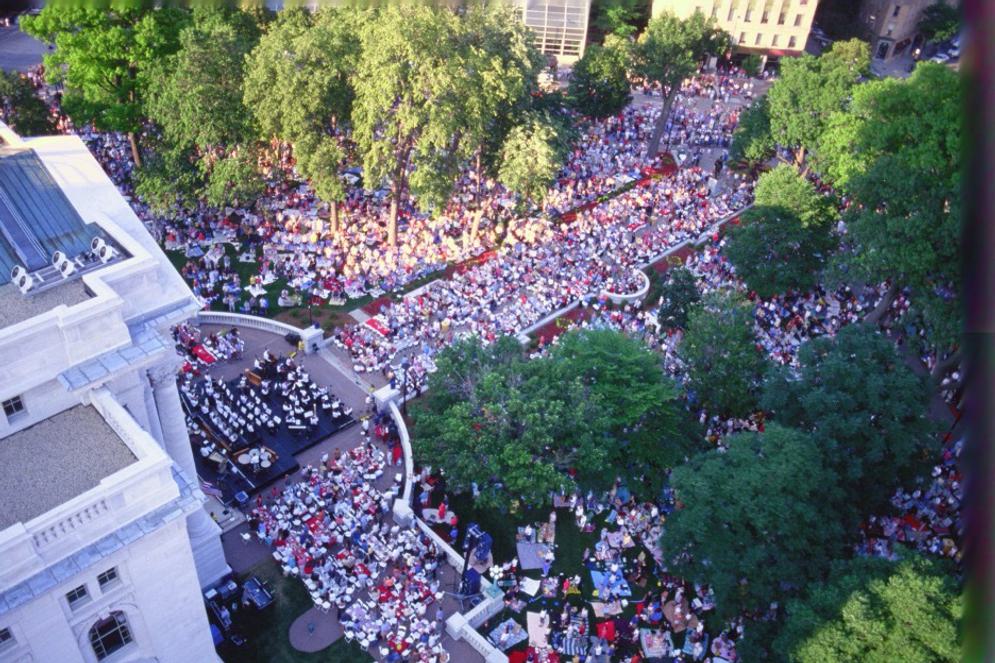
2003
Concerts on the Square celebrate its 20th season and includes Swedish rock pianist Robert Wells and Jennifer Koh, violin. Guest conductors Andrew Massey and Alistair Willis fill in after Andrew Sewell suffers a waterskiing accident in Seattle. Opening concert features Branford Marsalis, saxophone. The WCO finishes a decade of growth, achieving nearly a 500% increase in the annual operating budget ($370,000 - $2.1 million), ending each of those years with a small surplus that enables the WCO to build a reserve fund.
2004
The Young Artist Concerto Competition expands statewide. The David Lewis Crosby Scholarship Award offers a prize of $1,000 to the winner to perform at Concerts on the Square. The inaugural winner is 15-year old pianist, Christina Naughton. The WCO records and releases their first CD, Close to the Music. Overture Hall grand opening celebrations take place in September with our gala concert with Art Garfunkel.
The WCO completes the $5 million endowment match, helping to fund increases in musician compensation. Auditions increase from 110 applicants in 2002 to 450 applicants in 2004.
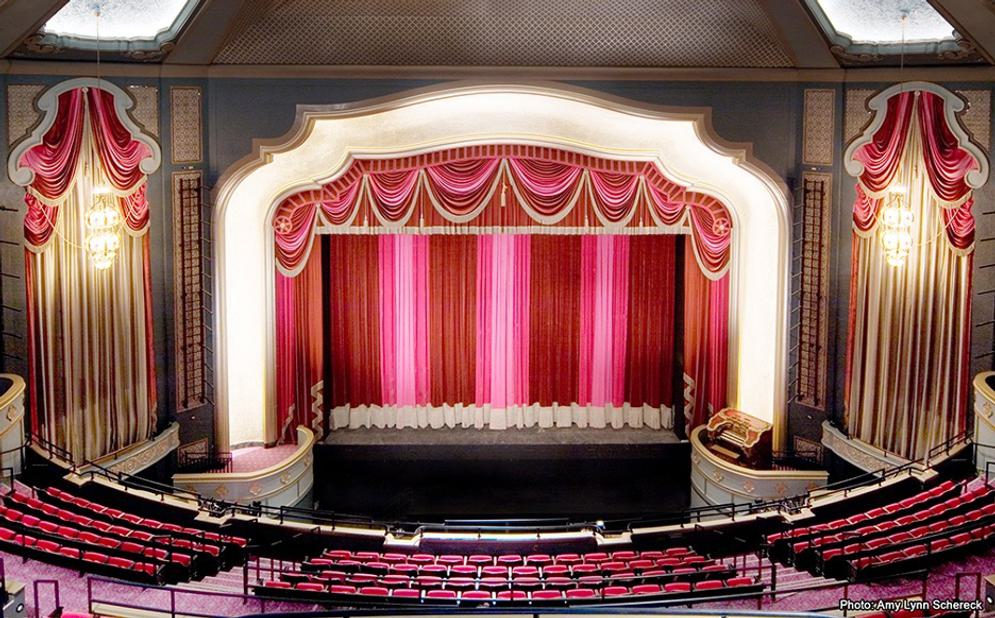
2005
The WCO opens its new home, Capitol Theater in the Overture Center in November with a pair of concerts featuring soprano Kathleen Battle, and pianist, Stewart Goodyear. Masterworks expands to five concerts. The WCO’s second CD, Momentum, is recorded. Concert in the Park features soloist Yang Liu, performing on a $3.1 million dollar Stradivarius.
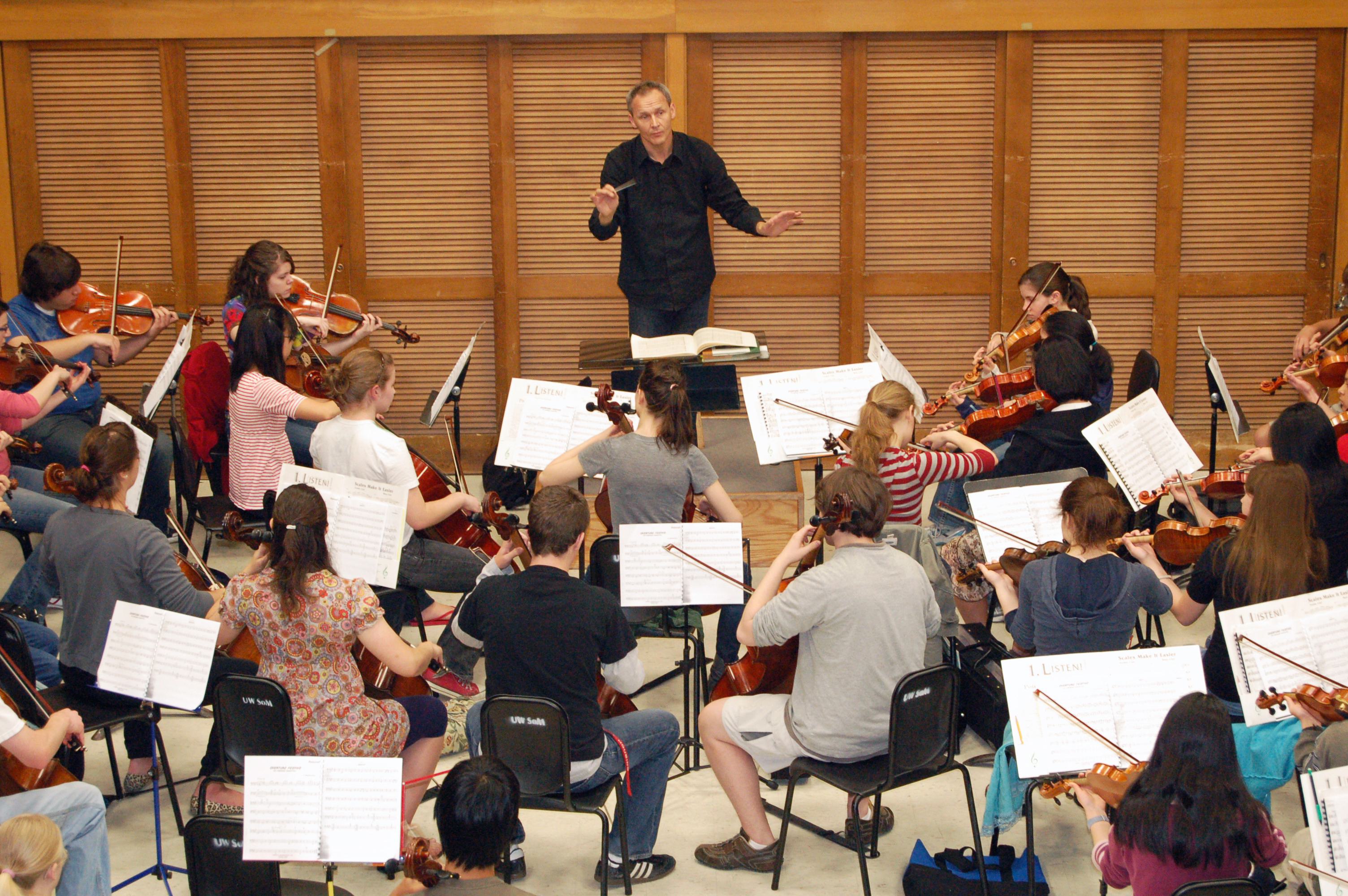
2006
Concerts on the Square celebrate Madison’s sesquicentennial, including Home to Madison, a song commissioned from Tracy Silverman. The first WYSO Side by Side Project is held. Masterworks features soloists pianist Garrick Ohlsson, French saxophonist Claude Delangle, violinist Rachel Barton Pine, and pianist Adam Neiman. The WCO records a double CD, Mozart – The Early Concerti, with Adam Neiman performing three early Mozart piano concertos and the Symphony No. 38 Prague, scheduled for release in May 2008.
2007
The WCO’s founder, Gordon Wright, dies at the age of 72 while on the porch of his cabin in Rainbow, Alaska. After 17 years, CEO Bob Sorge announces his departure to take a position at the Madison Community Foundation. Repertoire highlights to the indoor season include Mahler’s Death and The Maiden, Shostakovich’s Prelude and Scherzo, Shchedrin’s Chamber Suite. The WCO purchases a building downtown at 321 E. Main Street. The core orchestra is 34 musicians.
2008
The WCO marks the 25th anniversary of Concerts on the Square with special guests Philadelphia-based Time For Three, trumpet virtuoso Ryan Anthony, and pianist Wendy Chen opening with Rhapsody in Blue. The season includes a collaboration with the Isthmus Vocal Ensemble and Met mezzo-soprano star Kitt Foss performing for the finale summer concert. Doug Gerhart is appointed as CEO on September 1. The indoor season is cut short by the announcement of a musician strike on October 3, lasting seven months. Agreement is finally reached, and concerts resume on April 24, 2009

2009
Madison native and star pianist Christina Naughton opens the summer playing Rachmaninov, harmonica virtuoso Robert Bonfiglio returns, and Marimba sensation Kevin Bobo shines. The Maestro Minute podcasts are launched and the WCO introduces a new Messiah performance at Blackhawk Church in December. The last Halloween concert is performed with a Harry Potter theme. The 50th anniversary Masterworks season kicks off with 2006 Indianapolis Violin Competition winner Augustin Hadelich.
2010
The WCO celebrates 50 years of bringing classical chamber music to the people of Wisconsin. The WCO celebrates the 10th anniversary season of Maestro Andrew Sewell, including a Tribute to the Beatles night and Eugene Alcalay performing Tchaikovsky’s Piano Concerto No. 1. Youth Concerts continue a five-year plan for school students from grades 3-8 at the Capitol Theater.
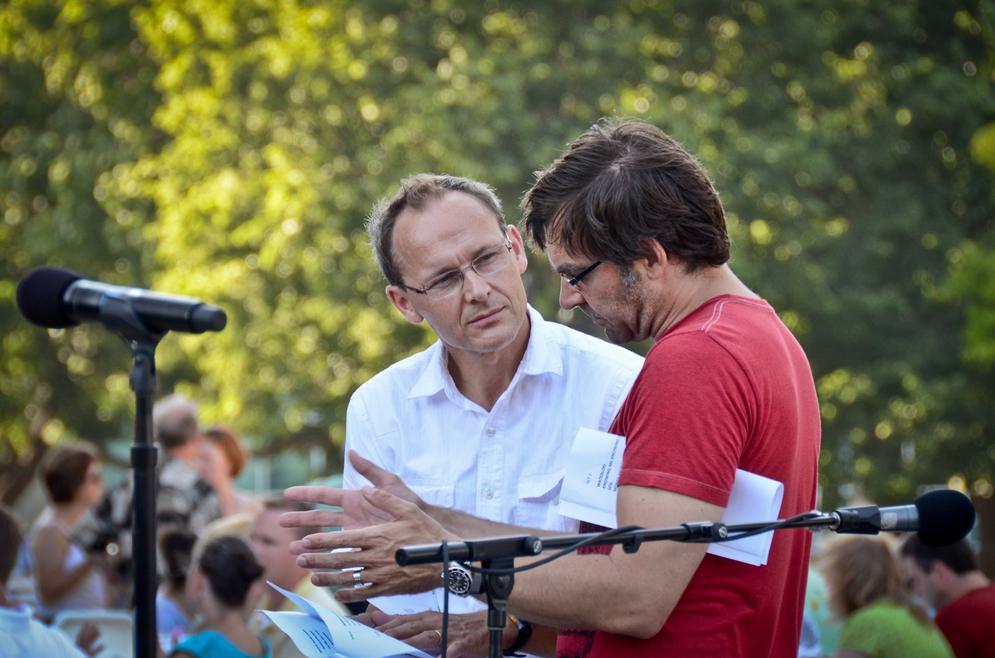
2011
Concerts on the Square feature Swedish ABBA tribute band, Arrival, as well as soprano Susanna Phillips. In a one-time Concerts on the Square historical feat, the WCO moves Concert No. 4, American Heroes, indoors to the Alliant Center when the rain date looks ominous. The Messiah chorus and Festival Choir of Madison combine for the first time for the annual Messiah performance. The WCO performs a winter runout to the Al Ringling Theater in Baraboo.
2012
Masterworks opens with the Five Browns, playing five pianos in a work by Nico Muhly: The Edge of the World. The WCO launches Wisconsin Pops in November with a Disney Spectacular and in March with a Paul McCartney Tribute in Overture Hall. English violinist Tasmin Little makes her debut with Finzi and Prokofiev, Paris Conservatoire saxophone professor Claude Delangle returns, as do pianist Anne Marie McDermott and soprano Susanna Philips, shortly after making her Met debut.
2013
Mark Cantrell becomes new CEO. The summer features several young artists from our Young Artist Competition performing a work by Alexander Prior for four soloists entitled Horizons. Lawrence University’s piano professor Michael Mizrahi performs Rhapsody in Blue for July 4th. The WCO repeats the Messiah at the Stoughton Opera House and welcomes the Canadian Brass for the Holiday Pops at the Middleton PAC.
2014
The WCO’s summer includes runouts at the Henry Vilas Zoo, Baraboo Circus, and American Players Theatre. Violinist Eleanor Bartsch’s Facebook post, playing to a circus elephant, goes viral. Concerts on the Square features a James Taylor tribute, the music of Chicago, and the season finale of U2 Tribute. The indoor season marks the 10th anniversary of Overture Center with a special performance involving all resident companies on September 27. The Masterworks season includes the opening duo of Rachel Barton Pine, violin, and Matthew Lipman, viola, performing Britten’s rarely heard Double Concerto. In December Messiah is performed in Madison, Stoughton, and Baraboo. The Nutcracker with Madison Ballet returns after four years. The WCO concludes the season with a Side by Side concert with WYSO at Overture Hall, after a seven-year hiatus.
2015
The summer includes pianist Michael Mizrahi performing the Paganini Variations by Rachmaninov and Richard Addinsell’s Warsaw Concerto. Young Artist Concerto winner is 14-year old violin sensation, Julian Rhee who performs the first movement of the Brahms Violin Concerto. The indoor season opens with violinist Benjamin Beilman performing Beethoven’s Violin Concerto, APT actor James DeVita narrates a New Zealand string work, Adam Neiman performs concertos by Poulenc and Shostakovich, Alexander Sitkovetsky, violin, returns, as does Dionne Jackson, flute, and John O’Conor performs piano concertos by John Field and Mozart. Concerts on the Squares yields three performances of the July 4th program; the Capitol, Portage, and Blackhawk Country Club.
2016
Concerts on the Square features local soloists, including Kitt and Alli Foss, Jerry Loughney, violin, and Young Artist winner, pianist Liam Mayo. Masterworks opens with Ilya Kaler performing the Tchaikovsky violin concerto. Our season concludes with a commissioned work, Double Rainbow – Concerto for Two Pianos, by Tom Cabaniss performed by Michael Shinn and Jessica Chow Shinn. The Holiday Pops features the Isthmus Brass Ensemble. The WCO’s Side by Side with the WYSO honors retiring WYSO music director, James Smith. There are two runouts in September to Henry Vilas Zoo and to open the new Monroe Performing Arts Center.
2017
The WCO begins Super Strings, a youth education program at the Lussier Community Education Center during the summer. Concerts on the Square highlights: soprano, Sarah Lawrence, Robert Bonfiglio, harmonica returns with an Elvis Tribute, Jeans ‘n Classics perform the music of Earth, Wind and Fire and Michael Jackson to a capacity crowd, and new principal flute Brandon LePage appears as soloist. The season includes a June runout of Concerts on the Square at University Ridge Golf Course for the Steve Stricker American Family Insurance Championship. 25th anniversary celebration of Concerts on the Square runout to Pauquette Park in Portage. Masterworks welcomes the debut of Giora Schmidt, violin and Alexandre Dossin, piano who performs MacDowell’s rarely heard Piano Concerto No. 2.
2018
The summer features American baritone, Jubilant Sykes, 11-year old cello prodigy Miriam K. Smith, and a record-breaking crowd of 60,000 for Don’t Stop Believin’ – the music of Journey and Queen.
The WCO records Double Rainbow, the commissioned work from 2017 with Michael and Jessica Shinn. The WCO embarks on a series of chamber music programs throughout the year performing in Sun Prairie, Monroe, Mount Horeb, and Mineral Point and debut a new Family Series, Beethoven Lives Next Door. CEO Mark Cantrell departs for a position with the Florida Orchestra in Tampa. Board Chair, Alan Fish steps in as interim Executive Director and a search is underway.
2019
The summer opens with Young Artist Competition winner, pianist Sakurako Eriksen, performing Prokofiev. Guest artists include virtuoso accordionist Sergei Belkin, concertmaster Suzanne Beia, a Beatles Abbey Road Tribute, and a season finale of Stravinsky’s Firebird Suite and Rachmaninov Paganini Variations with Ilya Yakushev. Joe Loehnis joins the WCO as the new CEO on September 1. The fall season includes a 20th Anniversary Gala at the State Capital honoring Maestro Sewell and celebrating the 60th anniversary of the Wisconsin Chamber Orchestra. A special Winter Celebration concert is given at the new UW Hamel Music Center of the Mead Witter School of Music with violinist, Rachel Barton Pine.
2020
The Masterworks season opens in January with Donald Fraser’s 2018 Sinfonietta and pianist, Orion Weiss playing Mozart. Violin virtuoso Giora Schmidt returns for Kabalevsky on February 24. When COVID-19 strikes in March, all remaining concerts are postponed to future seasons. The WCO becomes one of the only orchestras in the country to perform live as a full ensemble by putting on two social distanced Concerts on the Square performances at Breese Stevens Field. Both concerts were streamed online for free. One concert features the incomparable Tracy Silverman and the other welcomes perennial collaborators Jeans n’ Classics playing hits of the 60s, 70s, and 80s. Throughout the year, the WCO launches a new brand and look for the orchestra.
2021
Still unable to perform live indoor concerts due to the pandemic, the WCO creates the Winter Chamber Series. These online pre-recorded concerts present shorter programs of often lesser-known works, intercut with interviews of WCO musicians. Concerts on the Square remains at Breese Stevens Field for five concerts, but with a large in-person crowd at table, in blanket pods, and in the stands as well as an audience online. Highlights this season include a collaboration with local legend Leotha Stanley, up-and-coming bassist Xavier Foley, young piano phenom Maxim Lando, and a show-stopping celebration of disco with Jeans ‘n Classics.
2022
On January 28, 2022, the WCO's Masterworks series returned to the Capitol Theater after a nearly two-year hiatus. Performances for the shortened 2022 indoor season include Beethoven's Triple Concerto, a last-minute change in harp soloist to Bridget Kibbey after Yolanda Kondonassis falls and breaks her wrist, and performances by Eric Silberger and John O'Conor.
In March, the WCO announced a long-awaited return to the Capitol Square for the 2022 Concerts on the Square season.
